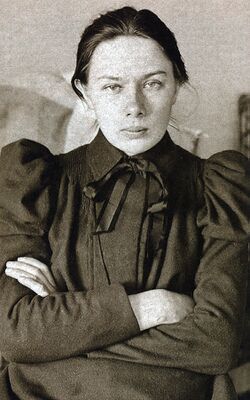Rózsá Prohászka
This article is incomplete because it is pending further input from participants, or it is a work-in-progress by one author. Please comment on this article's talk page to share your input, comments and questions. Note: To contribute to this article, you may need to seek help from the author(s) of this page. |
Rózsá Prohászka | |
|---|---|
| Ṷĭứí Ũṷīüíůủűí | |
 Princess Rózsá following her return from exile in 1909. | |
| Royal Princess of the Principality of Ruvelka | |
| In office 13 September 1918 – 13 November 1969 | |
| 1st Chancellor of the Ruvelkan Federal Assembly | |
| In office 13 September 1918 – 10 November 1924 | |
| Preceded by | Office established |
| Succeeded by | Kátálin Dorman |
| Personal details | |
| Born | Rózsá Lili Prohászka 12 June 1886 Innesburg, Cacertian Empire |
| Died | 13 November 1969 (aged 83) Debrecen, Ruvelka |
| Resting place | Hall of Heroes Debrecen, Ruvelka |
| Political party | Imperial Socialist |
| Parent(s) | Lilí Prohászka Alex Somogyi |
| House | Prohászka Dynasty |
Rózsá, Royal Princess of Ruvelka (Rózsá Lili Prohászka; Ruvelkan: Ṷĭứí Łĩłǐ Ũṷīüíůủűí; IPA: /roːʒaː lili prohaːskɒ/; 12 June 1886 – 13 November 1969) was a prominent Ruvelkan Imperial Separatist who helped instigate the 1914 December Uprising that led to the Second Ruvelkan Civil War. Rózsá served as both the head of government and head of state for the Principality of Ruvelka following the conflict and under her administration the nation became a rapidly growing multi-party socialist state.
Born in the Cacertian Empire as the granddaughter of exiled Matriarch Queen Edina Prohászka, Rózsá was raised within a relatively middle-class family. She was educated in Innesburg and later Cesena pursuing a degree in law. Although her family kept relatively out of the public eye following the end of the Red War, it was her time in Cacerta that began to heavily influence Rózsá’s political thought and she became highly critical of the policies implemented by the Communist government of the Socialist Republic. Kátálin Dorman, a descendent of Imperial General Pyotr Dorman and a prominent member of the underground Imperial Socialist Movement, reached out to Rózsá in early 1907 and the two future leaders of the Imperial Separatist Faction would meet in Cesena in May that same year. The next two years saw Rózsá and Kátálin quietly developing an opposition to the ever-increasing authoritarianism of the National Communist Party; Rózsá eventually returned home to Ruvelka in 1909 under an assumed identity.
After the 1914 Ruvelkan Revolution and having spent the last five years gaining support, Rózsá’s and Kátálin’s Imperial Separatist Movement took advantage of the internal political turmoil and launched a major uprising in December that officially began another Civil War. After the conflict, Rózsá responded to the wartime devastation by encouraging economic growth via market-oriented policies. In 1923, Rózsá stepped down as Chancellor and was succeeded by Kátálin.
Rózsá is widely considered one of the most significant and influential figures of modern Ruvelkan history and remained highly popular even after her death in 1969.